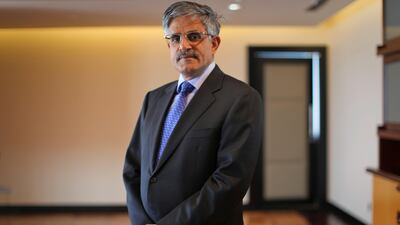Mumtalakat, the sovereign wealth fund of Bahrain, is interested in co-investing along with Mubadala Investment Company and Saudi Arabia’s Public Investment Fund (PIF) in Japanese billionaire Masayoshi Son’s $100 billion SoftBank Vision Fund, its chief executive said.
We are “very interested and very keen,” Mahmood Alkooheji said in an interview with The National. “Yes, there is potential [to invest]. It’s a very promising fund. He [Masayoshi Son] has a track record. He has the experience and a vision.”
Son's fund has had a 22 per cent rate of return in the last five months. The richest man in Japan has had a 44 per cent rate of return on his other investments over the 18 years and is famous for having turned his $20 million investment in China's Alibaba into $130bn.
Saudi Arabia’s sovereign wealth fund PIF has pledged to invest up to $45bn in Son’s fund, while Mubadala Investment Company, Abu Dhabi’s strategic investment firm, has committed $15bn.
_________________
Read more:
SoftBank Vision Fund evaluates "significant" Saudi Electricity stake acquisition
Saudi's PIF targets US$2 trillion worth of assets by 2030
_________________
Mumtalakat, which was founded in 2006, has a portfolio with $11bn in assets. The fund has stakes in Aluminium Bahrain, Bahrain Airport Company, Bahrain Real Estate Development, Durrat Khaleej Al Bahrain Company, and Southern Area Development. The fund has also invested in Dubai-based GEMS Education, a private school operator across 14 countries that is said to be eyeing an initial public offering in London that may value it at $4bn, according to Bloomberg.
“It's a promising one. If it happens it proves our point that education is a good sector to invest in,” Mr Alkooheji said, declining to provide any details.
Mumtalakat recently agreed with Arcapita to acquire a 90 per cent stake in NAS United Healthcare Services, an Abu Dhabi-based provider of outsourced health insurance processing services. The investment is part of the fund’s investment strategy that is focused on education, health and technology with an eye to leveraging renewable energy in the future.
The back-office of health care services “is an area of growth. There is a growing population and there is a lot of potential for the private sector to come and participate in health care,” Mr Alkooheji said.
Competition for health care assets across the Arabian Gulf is intensifying, as governments look to cut costs and increase the involvement of private companies in the sector. The region’s health care is forecast to grow to worth $71.3bn by 2020. NAS provides services to more 7,200 health care providers across the GCC region, the Middle East and India, servicing more than 500,000 insured members and processes in excess of 3 million medical claims per year.
Mumtalakat invests more than $100mn each year and expects to tap opportunities in Saudi Arabia and beyond, Mr Alkooheji said.
“We think Saudi Arabia is always a very promising market. We have been co-investors in many projects. We share the same ambition and aspiration,” he said. “The most important thing is the people — we need to look at our demography where our younger generation are going, where we need to create future jobs.”
Mumtalakat may exit some of its investments by the end of next year, Mr Alkooheji said. He declined to specify if the fund is currently engaged in any talks or expecting to close any deals.
“Every investment we do is a marriage. We study it carefully, if it fits our criteria we go into it. We do not have the pressure to finish a number of deals,” he said. “We do mature businesses that need expansion. Unlike other sovereign funds we have made a lot of money in economic development rather than commercial deals because we have a balanced portfolio.”

